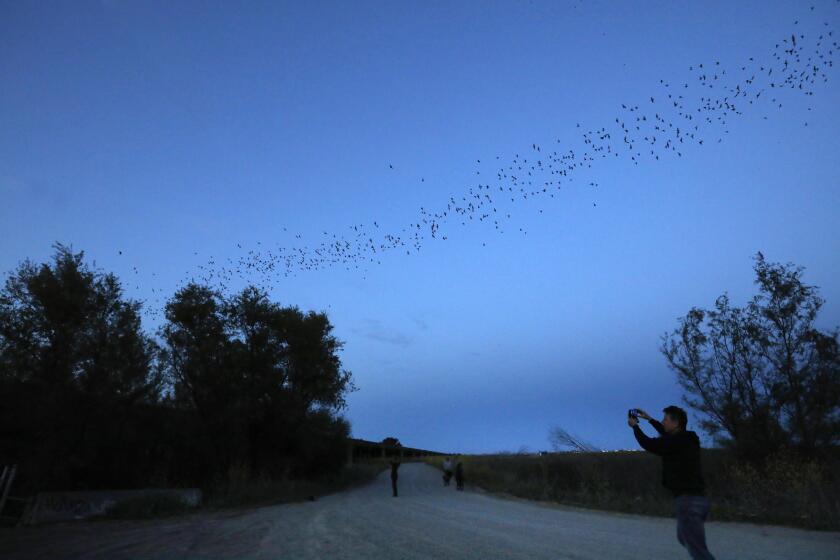D.A. Suspects Conspiracy to Sell Adulterated Cheese
The Los Angeles County district attorney’s office announced Wednesday that it had seized about 20 boxes of records from Jalisco Mexican Products Inc., the company whose Mexican-style cheese was contaminated with a deadly bacteria, and disclosed that a conspiracy may have existed in the firm to sell adulterated cheese to the public.
Dist. Atty. Ira Reiner, speaking at a press conference, produced records showing that the amount of raw milk received at the Jalisco cheese processing plant in Artesia between April 1 and June 12 totaled nearly 700,000 pounds more than the company’s pasteurizing capacity.
The “incredible discrepancies” in milk received versus milk pasteurized raises a “strong suspicion” that unpasteurized milk was deliberately mixed into the cheese, Reiner said.
He said the volume of unpasteurized milk the company received was an average of 10% higher than the capacity of its pasteurizing machines during the 73-day period examined by auditors from the state Food and Agriculture Department.
“In some cases, close to 200,000 pounds of milk product would come in on a given day, and approximately 150,000 pounds are used,” Reiner said. “There is too much there to account for spillage . . . so clearly it was used for something.”
“That’s just too much product for one person to deal with,” said Deputy Dist. Atty. Tom Papageorge, head of the consumer protection unit.
Jalisco President Gary McPherson, expressing dismay at the criminal investigation, met with reporters outside the plant Wednesday. He said he had no information on the auditors’ findings.
“I don’t know why they (the auditors) would say that because I don’t have the information,” McPherson said. “There would be no reason for us to do that. There would be a lot of reasons for us not to do it.
“To the best of my knowledge, we’ve never put raw milk in cheese,” McPherson said.
Health officials said the bacteria Listeria monocytogenes, which is normally killed during pasteurization, was found in some types of Jalisco cheese tested by the U.S. Food and Drug Administration.
As many as 46 deaths in California have been linked to Jalisco-made cheeses, but federal and state inspectors have not found the source of the contamination. They said the plant’s pasteurizing equipment worked properly.
Reiner said that if evidence is found that Jalisco employees deliberately skirted state dairy regulations, resulting in deaths, officers and employees at Jalisco could be charged with involuntary manslaughter. The district attorney said he may take the case to the county grand jury.
“It has not yet been determined whether the use of the non-pasteurized milk in their product caused the Listeria which caused the deaths,” Reiner said. “That linkage has not been made. However, non-pasteurized milk can create that condition and that is presently thought to be a strong suspicion.”
District attorney’s investigators served a search warrant on the Jalisco plant Tuesday night, one day after state Food and Agriculture Department officials came to the county prosecutor’s office and requested a probe.
Tuesday night’s search turned up only employee time cards for last week. The district attorney is seeking cards dating back several months.
“Time cards of employees in terms of production time is quite critical,” Reiner said. “There may be a perfectly reasonable explanation as to why they were not at the plant.”
In addition, Reiner said Jalisco attorney Steven Gigliotti removed company records last week and then reported them stolen from his briefcase. Prosecutors found duplicates of those records elsewhere.
Reiner said Gigliotti was within his legal right to remove the records, but the district attorney described the disappearance of the documents as “highly suspicious.”
“There are some things missing, but nothing we don’t already have copies of,” Gigliotti told The Times. “We made sufficient copies for all (government) agencies. I think probably they were just misplaced or another agency picked them up and used my copy and walked off with them. I certainly didn’t want to give the implication as something sinister.”
Gigliotti said of the missing time cards: “For 14 days we’ve been cooperating with all the agencies. All they have to do is ask for them. They have to exist somewhere. All the documents exist in one form or another, somewhere.”
He denied reports received by the district attorney’s office that a fire had occurred in a company safe. Reiner described the fire report as unconfirmed and possibly a rumor.
In an affidavit accompanying the search warrant, Mike Gillum, the district attorney’s senior investigator, said state inspectors found that the maximum capacity for the plant’s pasteurizing machine is 1,984 gallons--or 16,288 pounds--per hour. They compared this capacity to the bulk milk and skim milk received during the same time period.
Auditors found that in April, Jalisco received 3,165,419 pounds of milk product and pasteurized 2,893,556 pounds, a discrepancy of 271,863 pounds, or 9.4%. In May, the discrepancy was 295,174 pounds, or 10.4%. From June 1 to 12, it was 123,393 pounds, or 12.7%.
“The figures indicate that the pasteurizing machine could not have possibly pasteurized the amount of products received during the reported operating hours,” Gillum said in his affidavit.
Focus on One Day
Focusing on one day--April 1--Gillum said that the pasteurizing machine operated for slightly more than nine hours, according to monitoring devices that are, by law, attached to the machines.
At maximum capacity, the machine could have pasteurized 151,478 pounds of milk on that day, Gillum said. Jalisco’s shipping tags for April 1 reflected that the firm received 193,022 pounds of milk on that day--a discrepancy of 41,544 pounds or 21.5%.
Gillum stated that, based on these records and the tests that showed Jalisco cheeses contained an enzyme occurring in raw milk, he believes that the officers and employees of Jalisco took part in a conspiracy to violate state dairy laws.
“The scope and nature of this activity and the manufacturing process strongly suggest the existence of a conspiracy to commit these illegal acts,” he wrote.
Plant Shut Down
Jalisco voluntarily shut down its plant June 13 and issued a nationwide recall of its products.
Even after the suspect cheese products were pulled from most grocery shelves, the number of cases of Listeria infection has continued to grow.
The number of deaths reported to the state by Los Angeles County health officers stood at 41 as of Monday, according to Dr. Benjamin Werner of the state Department of Health Services. Werner said the figure is incomplete and does not include five recently reported deaths in Los Angeles County.
By Wednesday, Los Angeles County alone had identified 30 deaths in which a diagnosis of listeriosis had been confirmed since the outbreak began.
Recent Deaths Listed
The most recent deaths included the newborn baby of a 29-year-old Latino from eastern Los Angeles County (the mother is also suffering from listeriosis), the fetus of a 30-year-old Latino from East Los Angeles, a 62-year-old non-Latino male suffering from a chronic illness in northern Los Angeles County and a 59-year-old Latino woman from the San Gabriel Valley who also suffered a chronic illness.
The majority of the victims have been pregnant Latinos and their newborn infants; the Mexican-style cheeses are widely sold in Latino neighborhoods.
In Sacramento, Sen. Art Torres (D-South Pasadena) said he is preparing emergency legislation intended to tighten state Department of Food and Agriculture inspection standards for cheese manufacturers and make reporting of listeriosis a requirement of state law.
Times staff writers John Kendall and Robert Schwartz in Los Angeles and Paul Jacobs in Sacramento contributed to this article.
More to Read
Sign up for Essential California
The most important California stories and recommendations in your inbox every morning.
You may occasionally receive promotional content from the Los Angeles Times.










